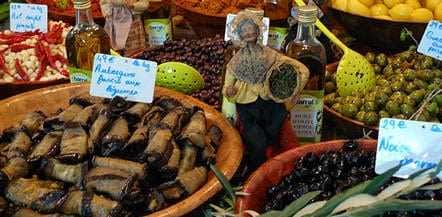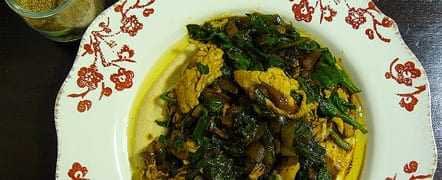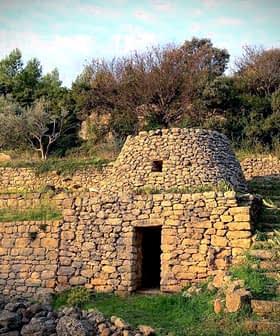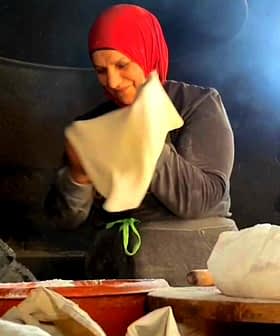If you take a leisurely drive through the verdant countryside of northwestern France, where lush pastures teeming with livestock remind you of the cheeses of Camembert and the scent of fermenting apples fills the air, you know you are a long way from Provence, or the flavors of the Mediterranean. In the north, the cow is king (and not in the Indian way). Around here, people like their beef, and it’s not a question of how much butter, but salted or unsalted. An olive tree does not grow in Normandy.
On the other hand, you can’t butter a salad, can you? Butter and olive oil may be created equal, but they certainly aren’t interchangeable. Butter vinaigrette? On the other hand, a big nob of butter always goes into my saute pan first, and it’s just the thing for baked carrots. A Frenchman would also say that butter is something into which you dip radishes, but I have yet to be convinced. Olive oil, on the other hand, is more of a southern flavor, and while I respect regional tastes and produce, I can’t help having an urge to reach for a bottle of the good stuff to add that final touch to my plate.
Finishing my food with olive oil is not a habit I acquired in France, but it is a ritual I learned long ago, a ritual that recalls my most important food memory. It is important not because it was the earliest or even the most dear, but because it marks the time when I discovered that I was deeply passionate about good food and skillful cooking. And even though I know my French friends, and even I, would like to say this passion was triggered by watching Julia Child or dreaming of the Le Cordon Bleu, I would be fooling myself. And I would be lying. While it’s true that my earliest fond food memories and my training to appreciate a finely crafted meal came from my Creole-cooking grandfather, the first time I actually stepped behind the line of a professional kitchen and learned real culinary skills, was at the side of a Palestinian chef.
You see, long before I knew anything about the smoking point of fats or how to make a good beurre blanc, I worked in a Mediterranean restaurant that fused the cuisines of Lebanon, Syria, Greece, and Turkey. I started as a waitress, but the chef/owner humored my interest in the cuisine and let me come behind the line and learn a few tricks. From him I learned the proper way to fold grape leaves, bake moussaka, blend houmus, make sour yogurt, and grill fresh sardines. I learned to love eggplant with and without its skin, to understand the importance of olives and capers and lemons, and why garlic should be grated, not chopped. Above all, I learned to use olive oil in everything. It was the alpha and the omega to every dish we served there. But it is also true that when we browned meat and onions, we used ghee, a clarified butter made from goat milk. We had no prejudices, we just knew every fat has its place. And we never used olive oil for high-heat cooking, because as the chef emphasized, “it is disrespectful to the oil.”
We kept two olive oils in the restaurant: one mild variety for sauteing and certain sauces, and a more peppery one which we used to enhance flavor in spicy dishes and which we poured over everything from hummus to big chunks of feta cheese or even yogurt. I loved the aroma of ground cardamom and coriander, a simmering pot of lamb stew on the stove. I can’t imagine any of those gorgeous and aromatic plates of food without good olive oil, and plenty of it. I will always long for the smell of that kitchen, those spices, so fragrant and warm and reminiscent of lands I have still yet to see.
At home in my French kitchen, I stuff rich salted butter under chicken skin before roasting it, and always close at hand is a liter of olive oil made from pure picholine olives from the pays du Gard. I go through the liter in a week‘s time, and most of it is for drizzling onto my food just before eating. Sometimes, I use it to make a staple dish I learned years ago, a meal where butter has its place and so does that other liquid gold. It may not be French, but it has won more than one French person over, and it will always be part of my immigrant heart. And in this gastronomically splendid country of Liberté, Égalité and Fraternité, I think we have room at the table for everyone.
Hummus bil Lahmeh (Hummus with Meat)
250 grams (about a half pound) of lamb, chicken or beef
Hummus (favorably homemade)
50 – 75 grams pine nuts
Ghee (can substitute butter)
Quality extra virgin olive oil
One large onion
Ground coriander
Smoked paprika (optional)
Salt and pepperIn a pan over medium heat, brown the pine nuts in a tablespoon of ghee until golden, then remove from the pan and set aside. Add more ghee if needed and the onion. When it is beginning to turn golden, season the meat with salt, pepper and ground coriander to taste, and cook until done. Meanwhile, allow the hummus to come to room temperature before evenly spreading onto the plate. Drizzle the olive oil over the hummus, then add the meat and onions, and top with the pine nuts. Finish with a sprinkling of paprika if using.
This dish can also be topped with bitter greens such as dandelion, which can be cooked like spinach then finished with lemon juice and olive oil.










